GETTY IMAGES
By Tara McKelvey BBC Leawood, Kansas
20 July 2020
20 July 2020
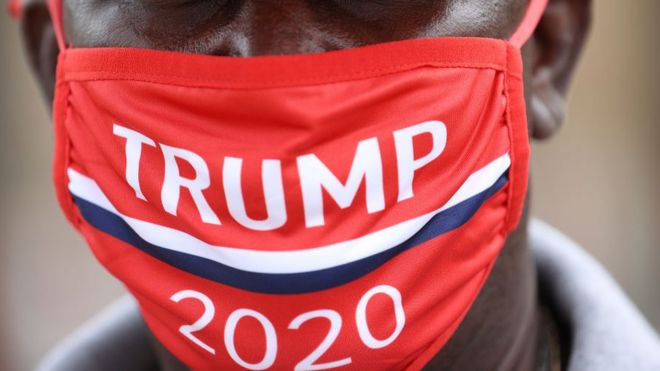
Some Trump supporters have been vocal in criticising masks but not all agree
In the midst of the pandemic, a small piece of cloth has incited a nationwide feud about public health, civil liberties and personal freedom. Some Americans refuse to wear a facial covering out of principle. Others in this country are enraged by the way that people flout the mask mandates.
Bob Palmgren tried to be polite - at first. He told a customer he had to wear a mask inside his restaurant, RJ's Bob-Be-Que Shack in Mission, Kansas. The customer, a man in his forties in a Make America Great Again (MAGA) cap, had flashed a gun and said that he was exempt from a state-wide mask requirement. He said that he could explain the exemption in the law to Mr Palmgren.
Mr Palmgren, a former marine, told the customer that he was not interested in continuing the conversation. Mr Palmgren was not swayed by the customer's gun, either. "Coronavirus doesn't care if you have a gun or not," said Mr Palmgren, describing his conversation with the customer. "I said: 'Now get the hell out of here.'"
The argument in the restaurant reflected a deep divide over requirements to wear masks in this country. People in Kansas, along with those who live in more than half of the country, are now required to wear masks in public as part of an ongoing effort to slow down the spread of the virus. But some people have been fighting against the mandate.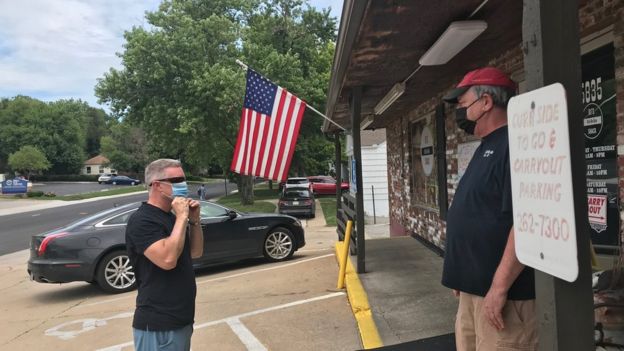 GETTY IMAGES
GETTY IMAGES
In the midst of the pandemic, a small piece of cloth has incited a nationwide feud about public health, civil liberties and personal freedom. Some Americans refuse to wear a facial covering out of principle. Others in this country are enraged by the way that people flout the mask mandates.
Bob Palmgren tried to be polite - at first. He told a customer he had to wear a mask inside his restaurant, RJ's Bob-Be-Que Shack in Mission, Kansas. The customer, a man in his forties in a Make America Great Again (MAGA) cap, had flashed a gun and said that he was exempt from a state-wide mask requirement. He said that he could explain the exemption in the law to Mr Palmgren.
Mr Palmgren, a former marine, told the customer that he was not interested in continuing the conversation. Mr Palmgren was not swayed by the customer's gun, either. "Coronavirus doesn't care if you have a gun or not," said Mr Palmgren, describing his conversation with the customer. "I said: 'Now get the hell out of here.'"
The argument in the restaurant reflected a deep divide over requirements to wear masks in this country. People in Kansas, along with those who live in more than half of the country, are now required to wear masks in public as part of an ongoing effort to slow down the spread of the virus. But some people have been fighting against the mandate.
 GETTY IMAGES
GETTY IMAGES
Bob Palmgren, the owner of RJ’s Bob-Be-Que Shack, tells a customer to put on a mask
The wearing of masks has become a catalyst for political conflict, an arena where scientific evidence is often viewed through a partisan lens. Most Democrats support the wearing of masks, according to a poll conducted by researchers at the Pew Research Center.
Most Republicans do not. The Republicans are following the lead of the president: Trump has been reluctant to wear a mask, saying that it did not seem right to wear one while he was receiving heads of state at the White House. He put a mask on in public for the first time during a visit to a military hospital earlier this month.
The battle over masks has escalated during the final weeks of the campaign season. The general election is in November, and activists in both parties, Republican and Democrat, are working feverishly to ensure victory at the polls. Some of them have faced off on the issue of masks: as Timothy Akers, a public-health professor at Morgan State University, a historically black college in Baltimore, says: "We're seeing politics and science literally crashing."
The dispute over masks embodies the political dynamics of the campaign. It also reflects a classic American struggle between those who defend public safety and those who believe just as deeply in personal liberty.
The conflict over masks is tense, volatile and deeply personal. Mr Palmgren, the owner of RJ's Bob-Be-Que Shack, was trying to follow the state mandate when he got into the argument with the gun-toting customer.
The wearing of masks has become a catalyst for political conflict, an arena where scientific evidence is often viewed through a partisan lens. Most Democrats support the wearing of masks, according to a poll conducted by researchers at the Pew Research Center.
Most Republicans do not. The Republicans are following the lead of the president: Trump has been reluctant to wear a mask, saying that it did not seem right to wear one while he was receiving heads of state at the White House. He put a mask on in public for the first time during a visit to a military hospital earlier this month.
The battle over masks has escalated during the final weeks of the campaign season. The general election is in November, and activists in both parties, Republican and Democrat, are working feverishly to ensure victory at the polls. Some of them have faced off on the issue of masks: as Timothy Akers, a public-health professor at Morgan State University, a historically black college in Baltimore, says: "We're seeing politics and science literally crashing."
The dispute over masks embodies the political dynamics of the campaign. It also reflects a classic American struggle between those who defend public safety and those who believe just as deeply in personal liberty.
The conflict over masks is tense, volatile and deeply personal. Mr Palmgren, the owner of RJ's Bob-Be-Que Shack, was trying to follow the state mandate when he got into the argument with the gun-toting customer.
Other stories about the masks have unfolded across the country. When workers in a Michigan pizzeria told a customer that she had to wear a mask, she made an obscene gesture, kicked someone in the restaurant and, according to local authorities, fled the police.
A fight over masks led to gunfire outside a Los Angeles grocery store, according to authorities, and a rapper named Jerry Lewis was killed.
The fight over masks is playing out against a backdrop of a health crisis that has reached historic levels. More than 3,544,000 people in the US have tested positive for the virus, according to the World Health Organization, and at least 137,000 people have died.
The divide between those who wear masks and the anti-maskers, as they call themselves, has become increasingly sharp. In interviews in the Midwest and across the US, people dug in their heels and defended their position, whether for or against the wearing of masks. Many of those interviewed sounded deeply mistrustful of people on the other side and blamed them for the nation's economic and public-health crises.
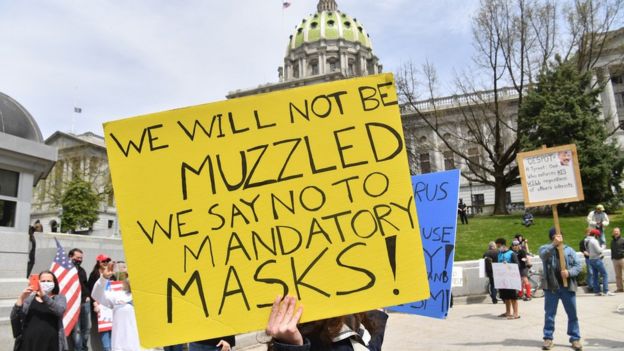
GETTY IMAGES
Anti-maskers at a rally in April to reopen Pennsylvania
Resentment was palpable in the voice of Susan Wiles, a retired sign-language interpreter, as she described what happened to her at her local supermarket, Publix in Vero Beach, Florida. Mrs Wiles, who has an autoimmune disorder, was riding in a motorised cart in the produce department when a worker "jumped back", she says, and gave her "a glaring look".
As she recalls: "He yelled: 'You're not wearing a mask.' It was quite a commotion. Another guy joined right in and said: 'She's a menace to society. Get her out of here.' Then he yells: 'Why don't you just go attend a Trump rally?'"
As it happens, Mrs Wiles has been to the president's rallies. A Trump supporter, she says that she does not wear a mask because she believes that the concerns about Covid-19 are overblown. "Sure, there's a virus," she says. "But people die of the flu every year." When it comes to the pandemic, she says: "I don't fall for this. It's not what they say it is."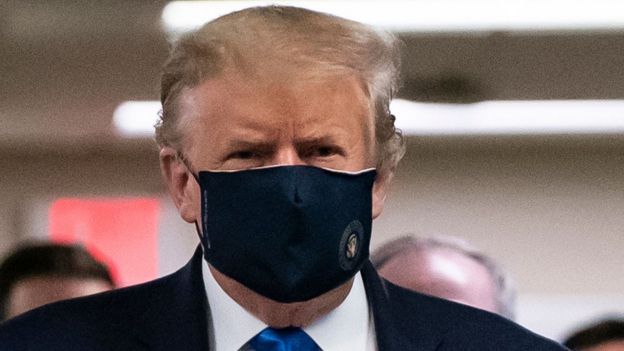
Resentment was palpable in the voice of Susan Wiles, a retired sign-language interpreter, as she described what happened to her at her local supermarket, Publix in Vero Beach, Florida. Mrs Wiles, who has an autoimmune disorder, was riding in a motorised cart in the produce department when a worker "jumped back", she says, and gave her "a glaring look".
As she recalls: "He yelled: 'You're not wearing a mask.' It was quite a commotion. Another guy joined right in and said: 'She's a menace to society. Get her out of here.' Then he yells: 'Why don't you just go attend a Trump rally?'"
As it happens, Mrs Wiles has been to the president's rallies. A Trump supporter, she says that she does not wear a mask because she believes that the concerns about Covid-19 are overblown. "Sure, there's a virus," she says. "But people die of the flu every year." When it comes to the pandemic, she says: "I don't fall for this. It's not what they say it is."

GETTY IMAGES
Trump finally wore one publicly in July
Since her confrontation at Publix, the supermarket chain has introduced a formal policy requiring customers to wear masks. It goes into effect on Tuesday. Walmart, CVS and other retail stores across the US have already put a mask requirement in place. This makes it harder for Mrs Wiles and other anti-maskers to stand by their principles. Yet some persist.
Neil Melton is a construction-project manager who lives in Prairie Village, Kansas, and he admires Mr Trump. When it comes to masks, Mr Melton does not think they are effective: "There's really nothing you can do to hide from the virus." He also believes that the mask mandates in Kansas and other states are an example of "government over-reach". He explains: "There are people in power who want to see what people will submit to."
The disease has been spreading rapidly in recent weeks in Oklahoma, South Carolina, Georgia and other conservative, Republican-leaning states where economies opened up early and where people are less likely to wear masks.
The way that Americans in these states and other parts of the country chafe at the mask requirement evokes a time when people here were first told to wear seat belts and not to smoke in restaurants. Americans initially resisted those restrictions, too. But now they follow these safety guidelines. Many have not yet taken to wearing masks, however.
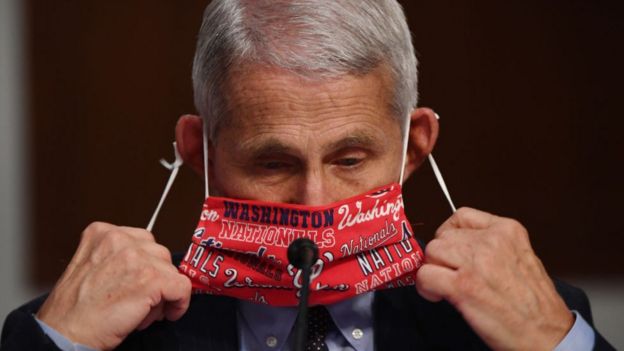
GETTY IMAGES
The advice from health experts is clear - masks work
One Trump supporter, Crystal Lynn, an administrative assistant in Fairfax, Virginia, says she does not like wearing masks because they make her skin break out. Besides that, she says that she does not think that masks work: "It's a false sense of security." She puts on her seat belt when driving because she knows they can save your life. But masks are not "in the same category", she says: "I don't think a mask protects you in any way."
The anti-maskers have expressed their views loud and clear. Yet overall people here accept the wearing of masks and have embraced them more readily than those who live in the UK. Nearly 60% of people in the US said they would always wear a face mask when they go outside, according to Covid-19 Behaviour Tracker. In the UK less than 20% said the same.
People who study infectious diseases have been struggling to make sense of the political divide over masks and understand the public reaction to the health guidelines. "Some people don't wear masks because they say that they don't 'work' - quote, unquote," says David Aronoff, the director of the Division of Infectious Diseases at Vanderbilt University Medical Center in Nashville. "There are other people who see masks as a violation of their rights."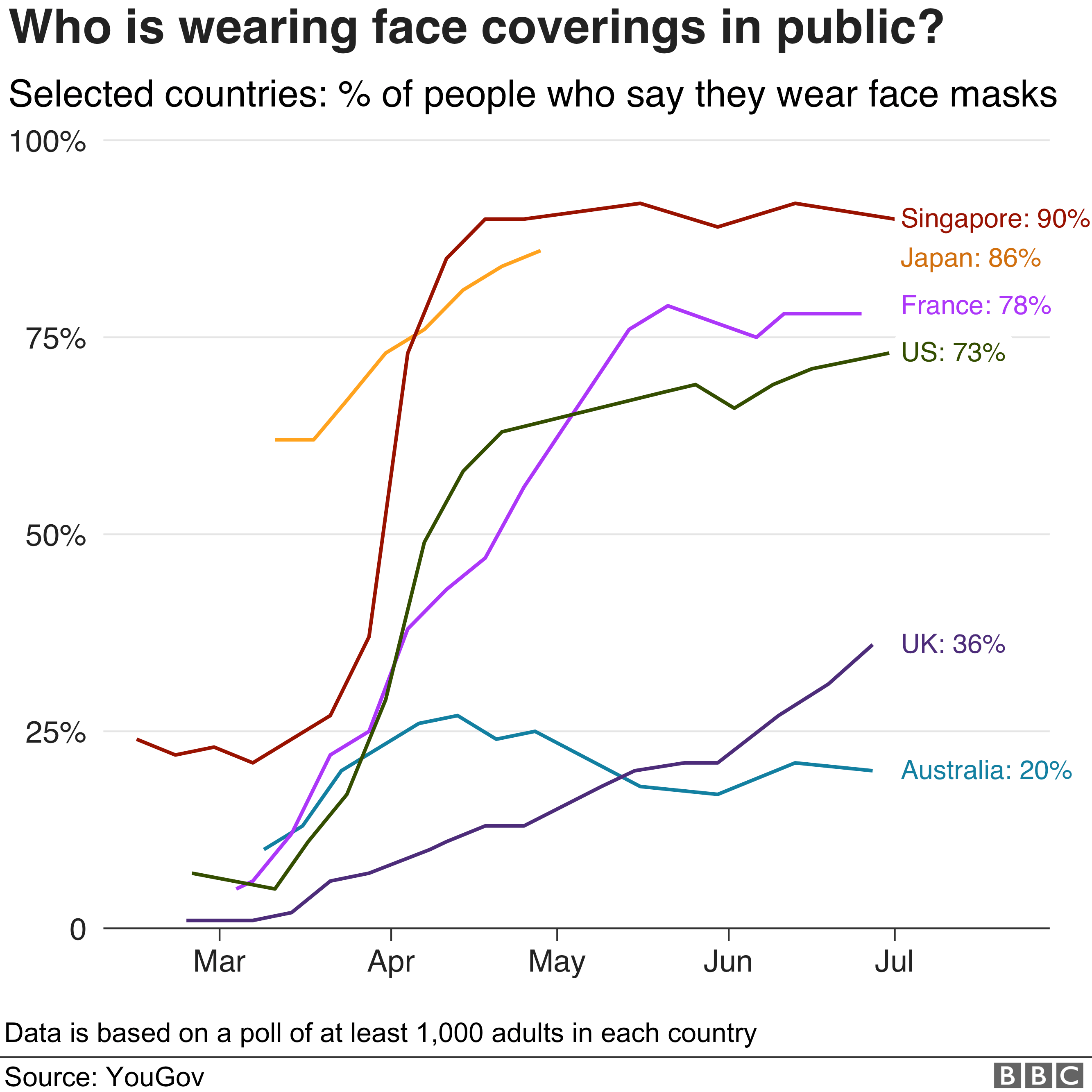
The views of anti-maskers are not shared by public-health experts. They say that wearing masks helps stop infected people from passing the virus on to others. Robert Redfield, the director of the Centers for Disease Control and Prevention, said recently in a webcast that if everyone in the US started wearing masks "right away", the epidemic would be brought under control within two months.
Their advice on masks has changed over the past several months, however, and at times it has been confusing. Earlier this year, public-health officials told people not to wear masks because they were concerned there would not be enough facial coverings for health-care workers. By late spring, scientific understanding of the virus and its transmission had changed, and so did the advice for the public.
This is what drives Democrats crazy. They believe that masks can help prevent the spread of infection and that if people covered their faces in public then the country could get back to normal faster.
For Matt DiGregory, a restauranteur who lives in Bernalillo, New Mexico, and his employees, the cost of the pandemic has been sharp. He closed down a number of restaurants because of the economic downturn. Of his 550 employees, only 60 are left.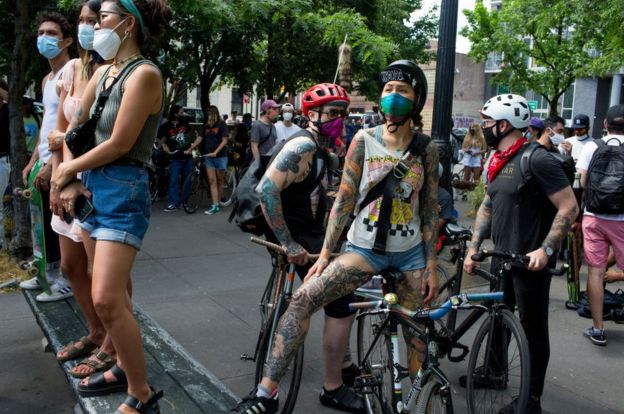
One Trump supporter, Crystal Lynn, an administrative assistant in Fairfax, Virginia, says she does not like wearing masks because they make her skin break out. Besides that, she says that she does not think that masks work: "It's a false sense of security." She puts on her seat belt when driving because she knows they can save your life. But masks are not "in the same category", she says: "I don't think a mask protects you in any way."
The anti-maskers have expressed their views loud and clear. Yet overall people here accept the wearing of masks and have embraced them more readily than those who live in the UK. Nearly 60% of people in the US said they would always wear a face mask when they go outside, according to Covid-19 Behaviour Tracker. In the UK less than 20% said the same.
People who study infectious diseases have been struggling to make sense of the political divide over masks and understand the public reaction to the health guidelines. "Some people don't wear masks because they say that they don't 'work' - quote, unquote," says David Aronoff, the director of the Division of Infectious Diseases at Vanderbilt University Medical Center in Nashville. "There are other people who see masks as a violation of their rights."

The views of anti-maskers are not shared by public-health experts. They say that wearing masks helps stop infected people from passing the virus on to others. Robert Redfield, the director of the Centers for Disease Control and Prevention, said recently in a webcast that if everyone in the US started wearing masks "right away", the epidemic would be brought under control within two months.
Their advice on masks has changed over the past several months, however, and at times it has been confusing. Earlier this year, public-health officials told people not to wear masks because they were concerned there would not be enough facial coverings for health-care workers. By late spring, scientific understanding of the virus and its transmission had changed, and so did the advice for the public.
This is what drives Democrats crazy. They believe that masks can help prevent the spread of infection and that if people covered their faces in public then the country could get back to normal faster.
For Matt DiGregory, a restauranteur who lives in Bernalillo, New Mexico, and his employees, the cost of the pandemic has been sharp. He closed down a number of restaurants because of the economic downturn. Of his 550 employees, only 60 are left.

GETTY IMAGES
Most Americans are happy to wear them
Masks, he says, are required for all those who visit the restaurants that remain open. If a customer does not have one, the workers have extra masks for them to wear while they are inside the building. "I think masks are the only way we are getting out from under this," Mr DiGregory says. "I'm incredibly sad that there's a political divide on this, and that there's people who think it's a hoax."
Some in Kansas and other states agree with Mr DiGregory even when they do not share his political views. Mr Palmgren, the owner of RJ's Bob-Be-Que Shack, likes the way that Mr Trump has been running the nation. But unlike the president, Mr Palmgren is not ambivalent about masks. Mr Palmgren insists that everyone in his restaurant has a face covering.
Several days after his encounter with the MAGA-cap-wearing, gun-toting customer, Mr Palmgren sounds more disappointed than angry about the incident. Mr Palmgren says the customer gave Trump supporters a bad name. Recalling the customer's demeanor, Mr Palmgren says: "That doesn't make MAGA look good."
Later that day, Mr Palmgren stood outside the restaurant. He called out to someone who was heading for the front door and told them that they needed a mask. For Mr Palmgren, the requirement is non-partisan and non-negotiable.
Masks, he says, are required for all those who visit the restaurants that remain open. If a customer does not have one, the workers have extra masks for them to wear while they are inside the building. "I think masks are the only way we are getting out from under this," Mr DiGregory says. "I'm incredibly sad that there's a political divide on this, and that there's people who think it's a hoax."
Some in Kansas and other states agree with Mr DiGregory even when they do not share his political views. Mr Palmgren, the owner of RJ's Bob-Be-Que Shack, likes the way that Mr Trump has been running the nation. But unlike the president, Mr Palmgren is not ambivalent about masks. Mr Palmgren insists that everyone in his restaurant has a face covering.
Several days after his encounter with the MAGA-cap-wearing, gun-toting customer, Mr Palmgren sounds more disappointed than angry about the incident. Mr Palmgren says the customer gave Trump supporters a bad name. Recalling the customer's demeanor, Mr Palmgren says: "That doesn't make MAGA look good."
Later that day, Mr Palmgren stood outside the restaurant. He called out to someone who was heading for the front door and told them that they needed a mask. For Mr Palmgren, the requirement is non-partisan and non-negotiable.
No comments:
Post a Comment